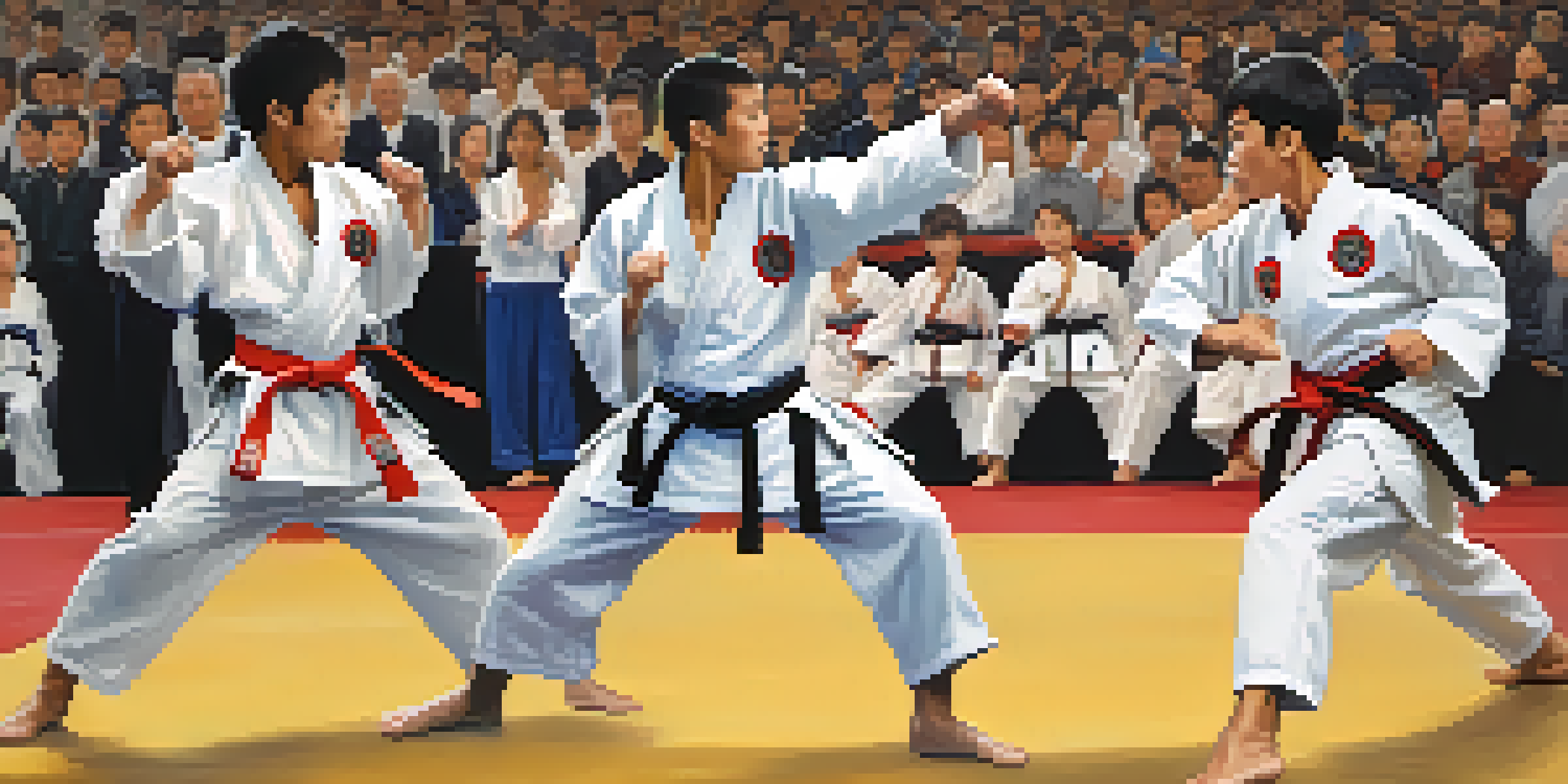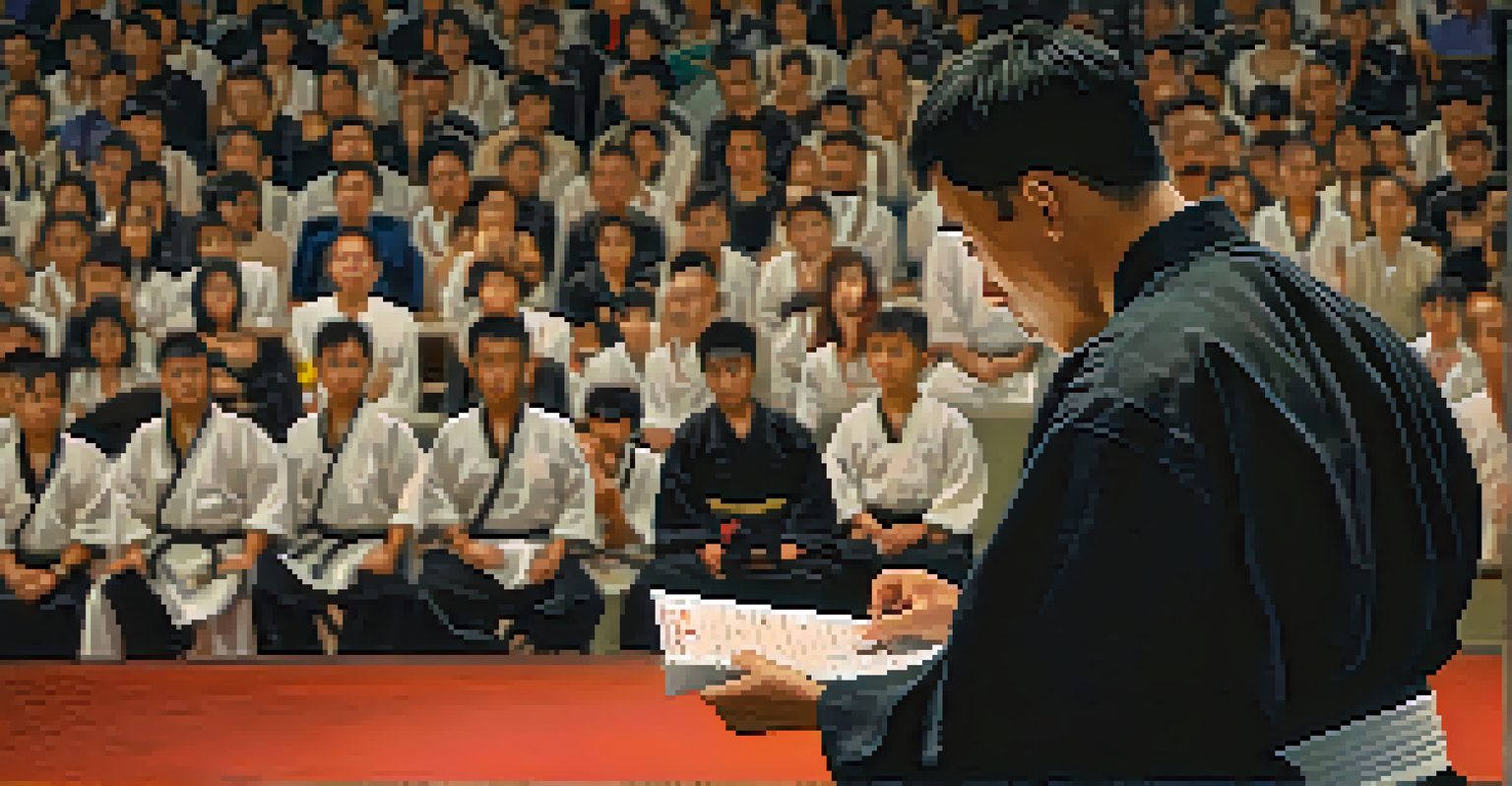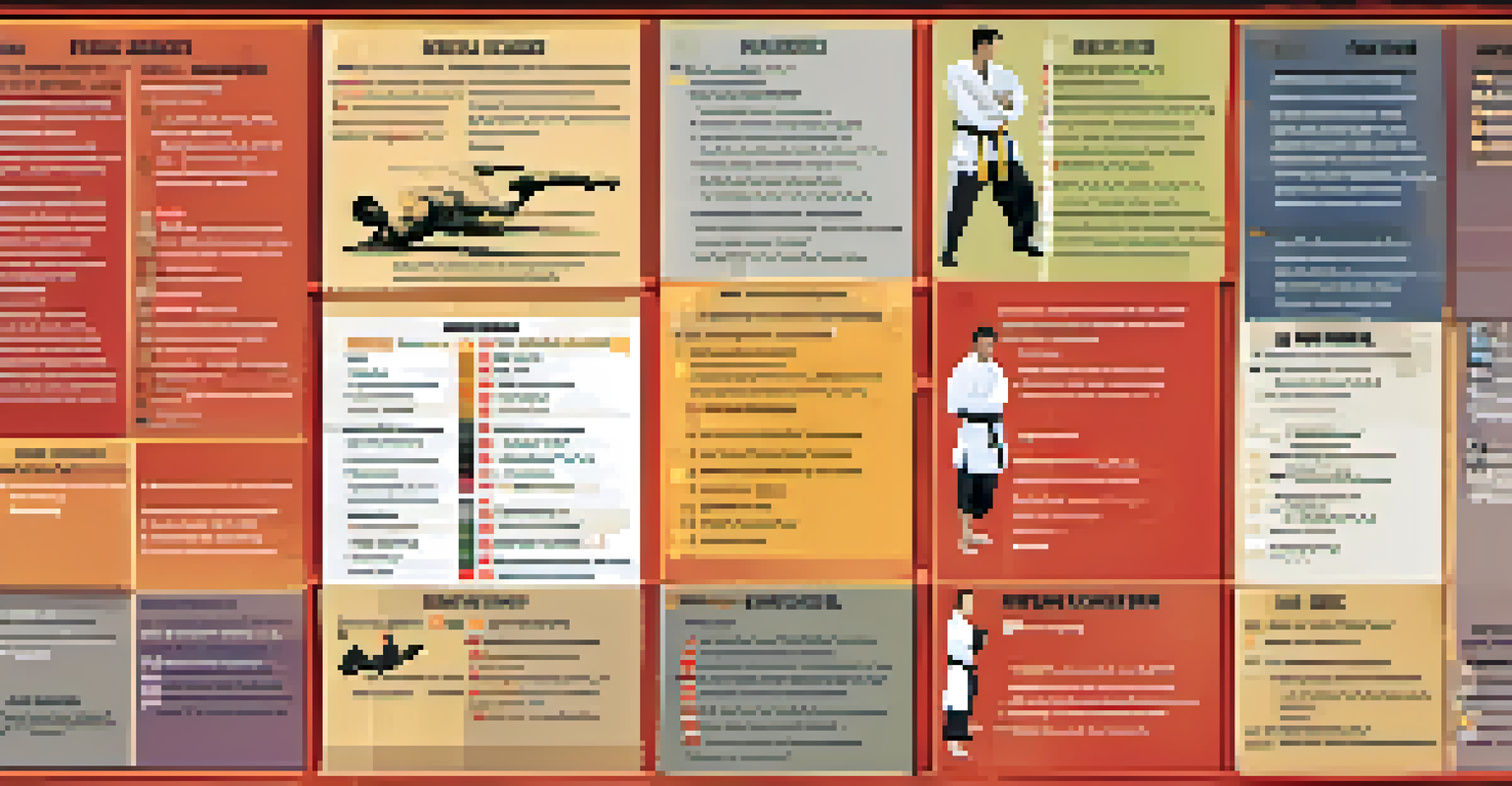The Impact of Judging Styles on Martial Arts Tournament Outcomes

Understanding Judging Styles in Martial Arts
Judging styles in martial arts encompass the criteria and methods judges use to evaluate competitors. Each style can vary significantly based on the martial art in question, whether it's karate, taekwondo, or judo. Understanding these styles is crucial for both competitors and coaches, as they directly influence how performances are assessed and ranked during tournaments.
The more you know yourself, the more you will be able to adjust to the criteria of the judges.
For instance, some judges may prioritize technical execution, while others might focus on the effectiveness of the techniques used. These differing priorities can lead to varied outcomes, making it essential for participants to be aware of the judging criteria that might apply to their specific event. This knowledge can shape their training and competition strategies.
Ultimately, grasping the nuances of judging styles can empower martial artists to tailor their performances accordingly. By aligning their techniques with what judges are looking for, competitors can enhance their chances of success in tournaments.
The Role of Subjectivity in Judging
One of the defining characteristics of martial arts judging is its inherent subjectivity. Judges often bring their personal experiences, biases, and preferences to the table, which can influence their scoring decisions. This subjectivity can create disparities in how different judges assess the same performance, leading to inconsistent outcomes.

For example, a competitor might receive high marks from one judge who favors aggressive striking, while another judge may penalize them for lack of finesse. Such variations can be frustrating for participants who strive for consistency and fairness in competition. It underscores the importance of familiarizing oneself with various judging perspectives.
Judging Styles Affect Performance
Understanding various judging styles helps competitors tailor their performances to meet judges' expectations.
Acknowledging the role of subjectivity in judging can help competitors manage their expectations and adapt their approaches to different judges. By understanding this dynamic, martial artists can better prepare themselves for the unpredictable nature of tournament scoring.
Impact of Judge Experience on Outcomes
The experience level of judges can significantly affect the outcomes of martial arts tournaments. More seasoned judges are likely to have a deeper understanding of the nuances of performance evaluation, leading to more accurate and fair scoring. Their expertise can help mitigate the effects of subjectivity.
In martial arts, as in life, understanding the perspectives of others is key to success.
Conversely, less experienced judges may struggle with the complexities of certain techniques or may be influenced by the excitement of the moment rather than the execution itself. This disparity can create challenges for competitors, especially in close matches where every point counts.
Competitors can benefit from knowing the background of the judges officiating their events. When athletes are aware of a judge's experience level, they can adjust their performances to align with what that judge might prioritize, ultimately influencing their tournament outcomes.
Cultural Influences on Judging Styles
Judging styles in martial arts are often deeply rooted in cultural traditions and philosophies. Different martial arts come from various cultures, each with its own historical context and values that shape how competition is perceived. These cultural influences can manifest in the judging process, impacting how performances are evaluated.
For example, a style that emphasizes respect and discipline might lead judges to reward competitors who demonstrate proper etiquette alongside their techniques. Conversely, a more aggressive style might focus heavily on the effectiveness of strikes, potentially sidelining other important aspects of performance.
Subjectivity Impacts Scoring
The inherent subjectivity in judging can lead to discrepancies in scoring, highlighting the need for competitors to adapt their strategies.
Understanding these cultural influences can provide competitors with valuable insights into the judging process. By recognizing the cultural context behind the judges' decisions, martial artists can tailor their performances to resonate more strongly with the judging panel.
The Importance of Clear Judging Criteria
Establishing clear judging criteria is essential for ensuring fair competition in martial arts tournaments. When judges have a well-defined set of standards to follow, it reduces ambiguity and helps maintain consistency in scoring. Clear criteria also provide competitors with a roadmap for what to focus on during their performances.
For instance, if a tournament specifies that judges should prioritize technical proficiency and control, competitors can adjust their training to emphasize these skills. This alignment between training and judging criteria can lead to more cohesive and predictable outcomes.
Moreover, transparency in judging criteria fosters trust between competitors and officials. When athletes understand how they are being evaluated, it enhances their confidence in the integrity of the competition, making for a more positive tournament experience.
The Influence of Judge Bias on Scoring
Judge bias can play a significant role in martial arts tournament outcomes, often stemming from personal preferences or affiliations. When judges have a connection to certain styles, schools, or competitors, it can unconsciously affect their scoring. This bias may lead to disproportionate evaluations that do not accurately reflect the performance.
For example, if a judge has a background in a specific martial art, they might favor techniques that align with their training, potentially overlooking the merits of other styles. This can create an uneven playing field where some competitors feel disadvantaged due to factors outside their control.
Cultural Context Matters
Cultural influences on judging styles can shape how performances are evaluated, making it essential for competitors to recognize these nuances.
Recognizing the potential for judge bias is crucial for competitors. By staying aware of these dynamics, martial artists can better prepare themselves mentally for the competition, focusing on delivering their best performances regardless of external influences.
Strategies for Competitors to Navigate Judging Styles
To succeed in martial arts tournaments, competitors can adopt strategies to navigate the complexities of judging styles. One effective approach is to study past competitions and observe the scoring patterns of various judges. This research can provide insights into what judges tend to prioritize, allowing athletes to tailor their performances accordingly.
Additionally, seeking feedback from coaches or experienced practitioners can help athletes refine their techniques and presentation. Coaches often have valuable experience in understanding judges' perspectives and can guide competitors in adjusting their approaches for different events.

Ultimately, being proactive in understanding and adapting to judging styles can enhance a competitor's performance and outcomes in tournaments. By embracing this adaptability, martial artists can turn the challenge of subjective judging into an opportunity for growth and success.